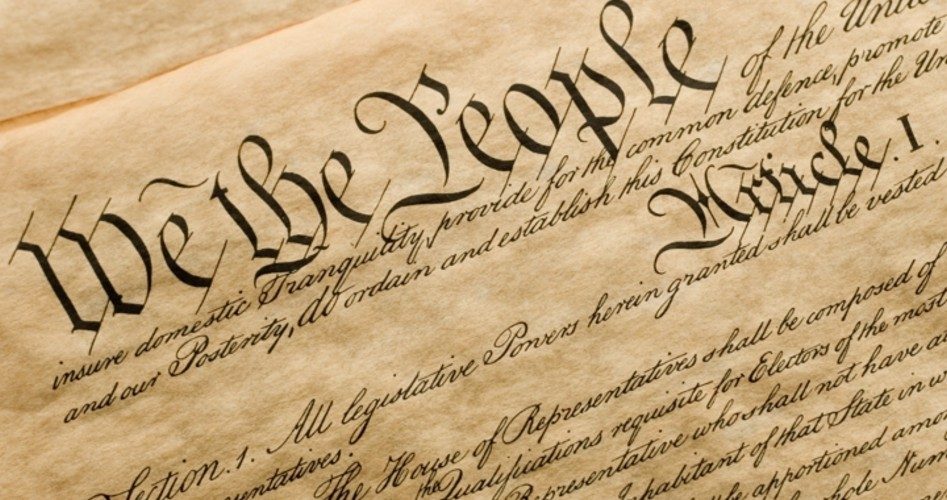
Joseph Cassidy, a “global fellow” at the Woodrow Wilson Center, a long-serving State Department official, a part of Yale’s Institute for Global Affairs, and a frequent contributor to Foreign Policy, has concluded that it is time for some structural changes to the U.S. government.
Writing in The Hill, Cassidy is advocating for some amendments to the Constitution. “The answer is a constitutional convention, but not one organized under the Article V process.” Instead, Cassidy proposes a “citizen-organized” constitutional convention. Although it could not produce a document with legal status, he argues that it could “establish the parameters of debate” as to what amendments are needed to put into effect what he calls the “need for more extensive structural reform.” He believes that this hypothetical citizen-led convention could “compel politicians to take positions.”
For the effort to be successful in “generating pressure for reform,” Cassidy contends that a “vigorous media operation” would be required to combat “disinformation and politicized attacks.” One can guess what Cassidy would consider “disinformation and politicized attacks” if the mainstream media is going to be the one combatting it.
It is clear that Cassidy wants the “convention” to adopt certain viewpoint — insisting that delegates “should commit ahead of time to reform principles.” But what if they strayed from the script? “A secretariat should have the power to control the text,” he writes. And just who would select this “secretariat” is left unsaid.
Lest anyone argue that it is unlikely that the delegates would be of the caliber of James Madison, George Washington, and Alexander Hamilton (after all, look who our present electorate has chosen to serve in Congress), Cassidy assures his readers, “America already possesses the equivalent in brain power and constitutional expertise to the ‘assembly of demigods’ who toiled through the hot summer of 1787.” Really? Nancy Pelosi and Chuck Schumer are of the caliber of Madison?
What is the ultimate goal of this hypothetical convention that would be controlled by an unnamed “secretariat?” Cassidy said it is to “propel amendments through the formal ratification process.”
At first glance, Cassidy’s proposal sounds like a pipe-dream, but a closer look at his credentials should concern any person who wants to preserve our constitutional republic of limited government. He is clearly a person with strong ties to the Deep State. Cassidy’s articles in Foreign Policy should be proper warning.
In one article, Cassidy asks whether Trump’s so-called Muslim Ban is “intentionally malevolent,” or “merely incompetent?” In another article, he questioned Trump’s selection of a person who “seems to question the mandate” of the Environmental Protection Agency he was nominated to lead. In other words, Trump’s pick was not an ardent environmentalist. Additionally, Cassidy expressed concern that Trump questions “the analysis” of “career intelligence specialists.” (Who elected them?)
This “citizen” Con-Con is clearly an idea that is being floated to get us to where the Deep State establishment wants us to go — in Cassidy’s own words, “more extensive structural reform.”
This should also be a warning to misguided Americans who have bought into the arguments for an Article V Convention, Convention of States, or whatever its proponents call it (essentially a new Constitutional Convention). As the late Supreme Court Justice Antonin Scalia warned, this is a bad century in which to write a Constitution. Scalia said, “I certainly would not want a constitutional convention.… Who knows what would come out of it?”
Indeed, that is the question that many “conservative” supporters of the Con-Con idea should be asking as well. Would only constitutional conservatives be elected as delegates to any such convention?
Much of the push for a Con-Con has come from conservatives, disenchanted with the tendency of members of Congress, presidents, and the federal courts to ignore the Constitution’s clear wording. But, if they are going to ignore the present wording of the Constitution, what makes these misguided conservatives believe Congress and the courts would respect a new amendment? After all, much of what Congress does presently is not authorized by the Constitution, which says the federal government’s powers are “few and defined.” Can anyone seriously argue that many of our federal office holders act as though their powers are “few and defined?”
The answer is an electorate better educated in the concepts found in the Constitution — limited government, individual liberty, checks and balances, federalism — not in another convention. James Madison said he feared for the future of the country if we ever had another constitutional convention. We should, too.
A look at some of the suggested amendments should give us pause. Liberals are salivating at the thought of amending the Constitution to abolish the Electoral College, gut the Second Amendment, restrict the freedoms enshrined in the First Amendment, and even give those in U.S. territories such as Puerto Rico the right to vote for president.
Although Cassidy’s proposal may seem, at first glance, to be like a proposal a junior-high school kid might come up with, we must assume it has a purpose — to condition the public to the idea of a constitutional convention, i.e., a Con-Con in which our republican form of government would be in jeopardy.




